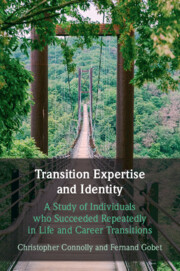 Transition Expertise and Identity
Transition Expertise and Identity Book contents
- Transition Expertise and Identity
- Transition Expertise and Identity
- Copyright page
- Dedication
- Contents
- Figures
- Tables
- Preface
- Acknowledgments
- Chapter 1 Introduction
- Part I Transitions
- Part II Transition Expertise
- Chapter 5 Cognitive Flexibility
- Chapter 6 Generative Intelligence
- Chapter 7 Personal Intelligences
- Chapter 8 Contextual Intelligence
- Part III Motivation
- Part IV The Project of the Self
- Appendix 1 Methodology
- Appendix 2 Nontransitions
- References
- Index
Chapter 7 - Personal Intelligences
Awareness of Self and Others in Transitions
from Part II - Transition Expertise
Published online by Cambridge University Press: 30 May 2024
- Transition Expertise and Identity
- Transition Expertise and Identity
- Copyright page
- Dedication
- Contents
- Figures
- Tables
- Preface
- Acknowledgments
- Chapter 1 Introduction
- Part I Transitions
- Part II Transition Expertise
- Chapter 5 Cognitive Flexibility
- Chapter 6 Generative Intelligence
- Chapter 7 Personal Intelligences
- Chapter 8 Contextual Intelligence
- Part III Motivation
- Part IV The Project of the Self
- Appendix 1 Methodology
- Appendix 2 Nontransitions
- References
- Index
Summary
Historically, most intelligence theories include the personal intelligences that encompass apprehension of one’s own experience, the ability to understand and manage people, and insight into the states of other people. Intrapersonal intelligence enables an individual to cultivate self-awareness, which operates during transitions at three progressive levels. Self-knowledge is produced by reflective thinking and is the basis for growth and development. The capacity for self-assessment follows and evaluates strengths and weaknesses during a transition. This supports self-development, which turns awareness into action. Interpersonal intelligence enables an individual to empathize with others, manage relationships in mutually beneficial ways, give and receive feedback, and build collaborative relationships that develop and ultimately lead others. The personal intelligences are investigated through retrospective interviews with twenty-four elite performers in three domains (business, sports, and music) who successfully and repeatedly transitioned to higher positions within their field.
Keywords
- Type
- Chapter
- Information
- Transition Expertise and IdentityA Study of Individuals Who Succeeded Repeatedly in Life and Career Transitions, pp. 110 - 144Publisher: Cambridge University PressPrint publication year: 2024
